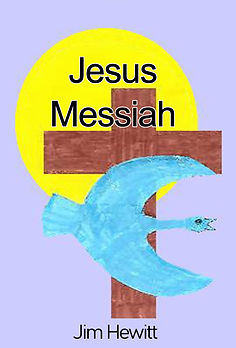
Jesus Messiah
An introduction to the book
The challenge of Jesus the Messiah is first of all to Christians. It's easier to believe in a Lord, a Saviour, a Son of God, much as these titles challenge our intellectual and psychological responses. "Messiah", however, challenges us to a profound engagement with contemporary society. It is the one title which cannot be defined apart from the actual world to which God is now reaching out, giving the Messiah to rule and rescue it.
The Church, which has poured out ink and blood in the definition of the other titles, has left "Messiah" alone, letting it dwindle into a mere name, "Christ". For when you try to define "Messiah", you find the Messiah defining you, and telling you what your choices are in a world which the rule of God is reshaping and redefining.
Born under the proclamation of a revolution, the downfall of the powerful and the rich, and a vision of salvation through the forgiveness of sin, the Messiah is endowed with the Spirit of God to rule the world and history as the Son of God. In the wilderness, Jesus learnt that it meant rejecting the way of power, its self-serving, its self-promotion and its lust for domination.
In the towns and villages of Galilee, Jesus proclaimed the coming renewal of Israelite society under the rule of their God - the Kingdom of God. It called for a change of heart, lifestyle and society. With scandalously direct authority, he declared the forgiveness of sins, and people who knew their need of forgiveness and healing were drawn to him. The elite, however, the rich, the influential, the powerful, were not happy. He challenged their understanding of the ways of God and their standing as masters of the Law and of the people.
The question arose: Who is he? He was preparing his disciples for a role in the Kingdom of God, yet warning them against any aspirations to power, status or wealth. His teaching is a mixture of values we recognise, like the eager pursuit of justice, values about which we're ambivalent, like gentleness and forgiveness, and the startling new values of God's solidarity with the suffering, the poor, the persecuted.
It's a question still for the 21st century. A modern Jewish Rabbi reminds us that there cannot be a Messiah without a changed world, yet the disciple Peter recognised Jesus as the Messiah and was recognised by him as the first of many who would be the Messiah's assembly. Do we believe that he is the Messiah, and therefore that there is a new world order in which he rules, where there is no place for the rich, and where love and faith are decisive?
Jesus' own government did not believe it. Jerusalem, the religious and political centre of Jesus' nation, would be hostile to him as a threat to the traditions and structures on which their power depended. Yet he went deliberately to Jerusalem, for the kingdom of God had to be proclaimed there, at the heart of Israel's civic, political and religious identity.
In Jerusalem, he spoke freely in the Temple courts (the Temple was a more democratic institution than a church or cathedral) but power is power everywhere and the Temple authorities contrived to arrest him by night. He was condemned and foisted onto the Romans for a more hideous and definitive execution. Mark, the first of the gospel-writers, shows us in the events of a night and a day the meaning of history. He shows us the role of sin, from a gossiping servant to a cynical Governor, and the Messiah's helplessness in the face of power. Deserted by his followers, Jesus dies abandoned, still able to turn to God, but only to ask, Why?
And yet, he is the Messiah. His death is his emergence as Messiah in the complete renunciation of power. God does not do power. But God does do strength, energy and adventure. God does life, even when power and death have done their worst. The Messiah so inaugurated is raised from death and the living Jesus now rules, not by power but by the giving of God's Spirit, the life, strength and adventure of God to be the vision and rule of all the centuries, and of our century.
The future belongs to those who believe in the Messiah. The time has come for us to sing the revolutionary song of Jesus' mother in the streets of Westminster and the priest's song of the dawn of mercy in the streets of Washington. It is time to proclaim the Messiah's world to all our nations.